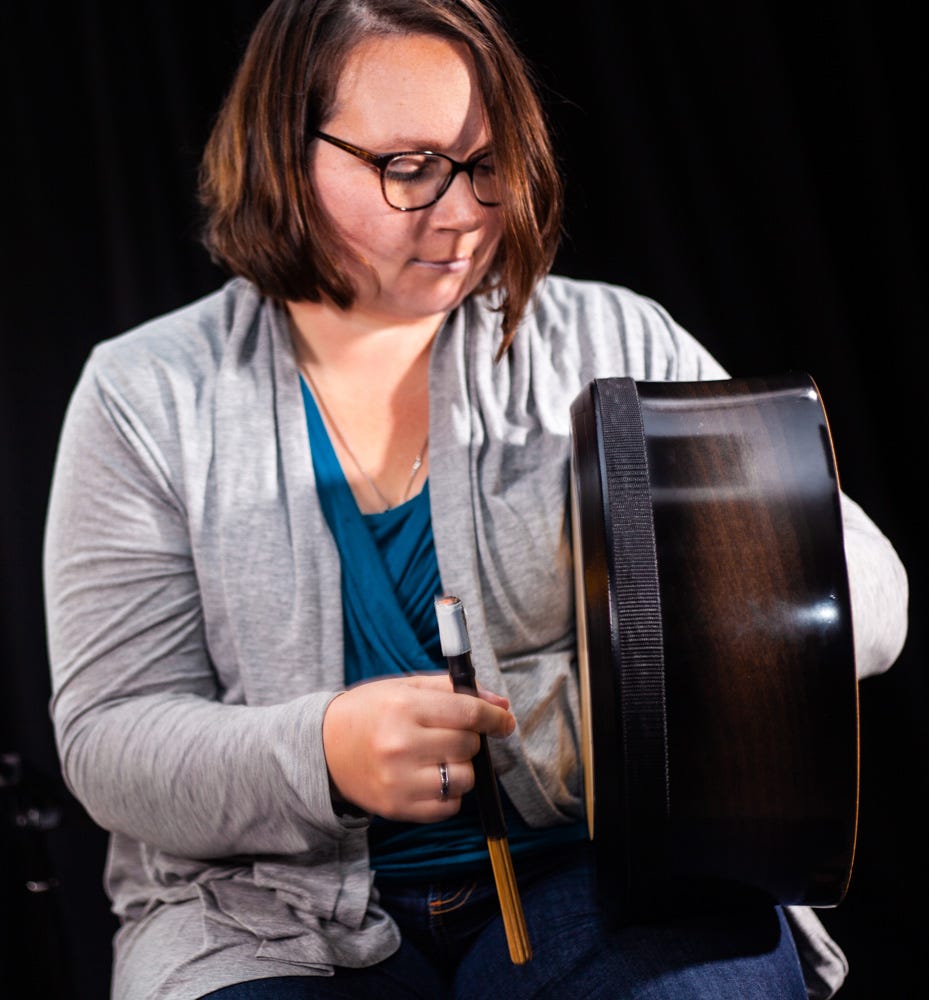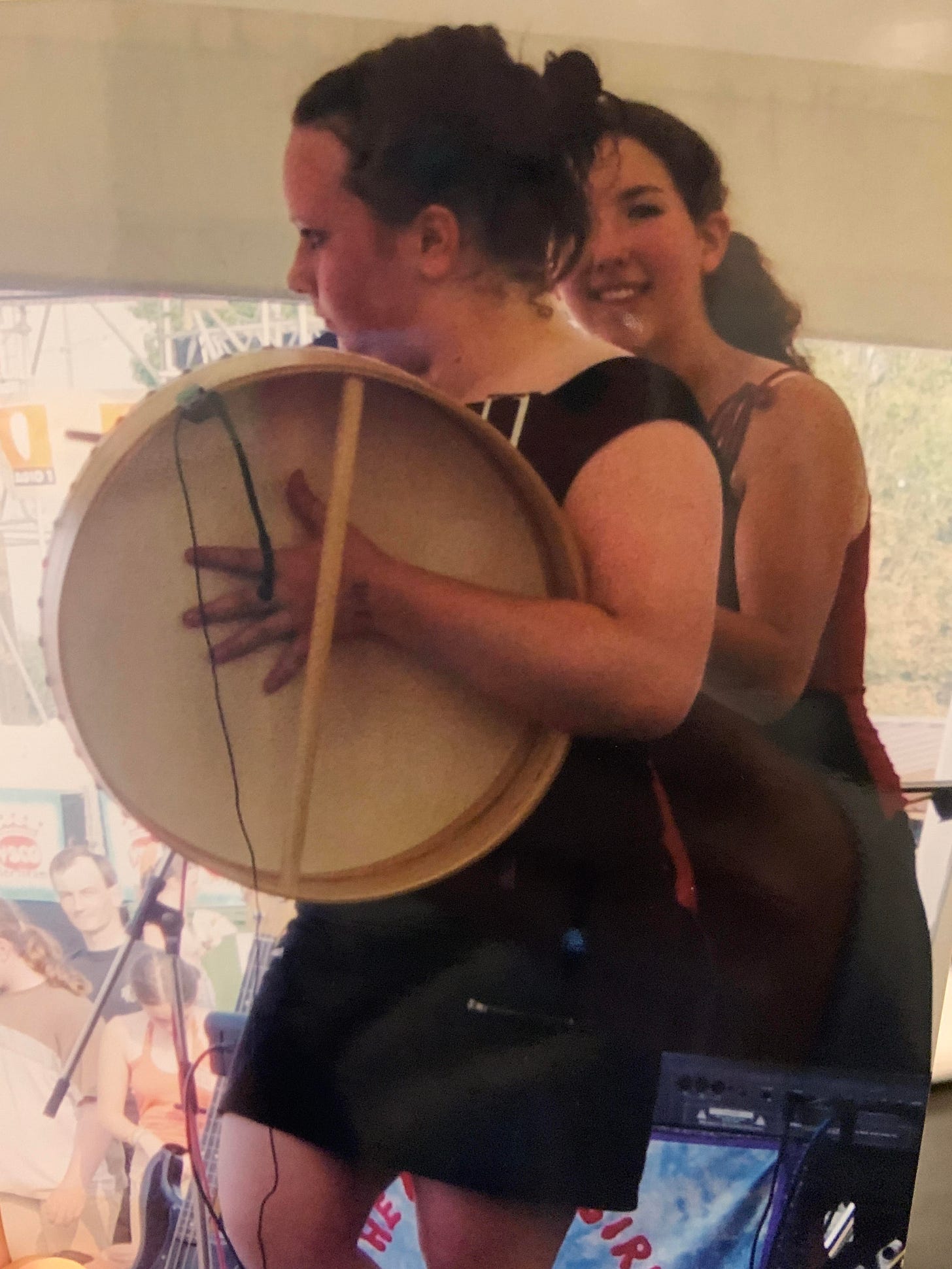Marissa Waite was 10 years old when she joined her first band in Vancouver Island, Canada, and just 17 when she moved to Scotland to study the bodhrán. She’s been there ever since.
“I always feel so strongly that you should play exactly how you want to play in the style that you feel is best,” she told me during a recent video call. “That shouldn’t be dictated by anything else.” The rest of our conversation is below.

(Chris Waite)
Today, along with her own web design business Marissa Waite Creative, she runs her own online bodhrán courses from her website, Modern Bodhrán. You can follow her on Facebook, Instagram, and YouTube.
You’re reading Fanny Power, a newsletter about women bodhrán players, now back after a short break because 2020. Check out the last interview with Cara Wildman, subscribe if you haven’t already, and make sure to forward this to a friend or two!
Marissa and fiddle player Jenna Reid, from Shetland, play a jig and reel. (Via Modern Bodhrán)
Marissa Waite
On style
Learn all the styles, listen to different players, don’t just stick with one thing! My style is really modern, more groove based than ornamental Kerry style. But there are some aspects to my playing that people would classify as more traditional. I play a smaller drum, but I like it tuned a lot lower, and I let my low tone ring out more than a lot of modern players. I play Martin O’Neill’s Hedwitschak drum, I’ve had it seven or eight years. I still have my really old Seamus O’Kanes—they’re so beautiful. I wouldn’t fly with them anymore, but I might play them round here.
I always play with the hot rod style stick, so the tone is more muted. The one that I use right now, I’ve probably had for 10 or 12 years. A guy that made sticks in Glasgow gave me one in a session one night, and that was it. If I lost that I don’t know what I’d do, I’ve never found one that I like as much.
On starting out
I always played music since I was seven or eight, silver classical flute was my first instrument. I played flute and guitar in a band when I lived back home—we started when we were 10 and did it until we were 17. Our parents were really involved from the beginning. It was called the Island Girls, because we were from [Vancouver] Island. I’m French Canadian, my Dad’s from Quebec, so we did a lot of French Canadian music, Irish, a mix. Over there in the circles I was playing in there’s not a specific tradition.
We gigged so much that we paid for four albums, we toured in Europe a couple of times, we went back east to Winnipeg and Quebec. I was a huge band geek, that was pretty much all I did when I was at school. It was fun. It was pretty intense so I was a bit tired of it near the end, but it totally took me to where I ended up, studying music.
One of the girls that joined was playing the bodhrán and I thought, “That looks kind of cool.” I must have just picked it up at practice and played it a little bit. I think I was 15 when I bought my first drum and wanted to get properly into it, because I really enjoyed it.

Marissa playing her first drum, a Belgarth bodhrán, at Dranouter Folk Festival, Belgium, in 2004. (Courtesy of Marissa Waite)
On moving to Scotland
I was 17 when I moved to Scotland. I wanted to study music, and I think I was looking at Newcastle, Glasgow and Ireland. I knew I wanted to study the bodhrán, not specifically Scottish music but I think that was more what I was drawn to. I played saxophone and trumpet and had a scholarship to study jazz in Quebec and my parents were like, “You could have this great scholarship, flights home and everything…” And I was like, “No. I’m going to Scotland to play my bodhrán.”
I’ve always felt more natural on the bodhrán, even though I’ve been playing the flute for longer.
When I first applied to what is now the Royal Conservatoire of Scotland, I wasn’t allowed to do bodhrán as a first study instrument. I wanted to do guitar second study. They said I could go, but I’d have to do flute first study, bodhrán second. I was thinking, “I’ve been playing the stupid flute forever, I just want to play my drum!”
Martin O’Neill was teaching me, but he was touring a lot, so we would have a couple of hours together every few weeks. I know someone doing bodhrán as their first study now—I think he maybe just asked if he could do it. The timing worked out for him and the course had been around for that much longer. It’s possible the instrument is being taken more seriously.
My sight reading is good, but culturally here there’s more learning by ear than you would get in high school band. I really struggled learning tunes by ear on the flute, but the bodhrán not so much, I’d taken workshops with Martin so I knew his notation, it’s similar to drum kit or snare scores.
The session scene in Glasgow—at least back then—it was cliquey. A lot of people are really nice and think it’s cool that I came here, but there were also people at university saying, “The foreign students are just here because they pay a lot of money.” That’s a minority, but there’s a feeling that you don’t really understand the culture, or that you shouldn’t be able to interpret it because you’re not from here.
The qualification has been useful when I applied for some of my teaching jobs, but it doesn’t carry as much weight as I thought it would. You can be the most amazing player in the world but if you’re not nice, people aren’t going to want to work with you and it doesn’t matter if you have a degree. The more important thing [about the course] is the relationships and the collaboration. For someone from Canada like me, to be in Glasgow meeting people who wanted to play was invaluable.
On Scottish music
My great-grandmothers were Scottish, though I didn’t really know that much about it before I moved here. Before, I would have called Scottish music just “folk,” but now that I’ve studied it, I hear the difference. The instruments that have a long history in Scotland are the bagpipes, the clàrsach, not the bodhrán. In Irish music you get more in the way of hornpipes and polkas, and the Irish style of playing the bodhrán, traditionally, is different from the modern contemporary style, which I wouldn’t class as Scottish or Irish.
A lot of the bodhrán players that people look up to are Irish guys. I would say Martin O’Neill has been an iconic Scottish player, although there were players who were around long before. The way that he teaches and developed technique—I think he’s been really important for the development of the instrument.
I used to teach a lot, in Glasgow it was maybe half my income. I loved teaching, I did kids and adults so it was a nice mix. I stopped playing for a couple of years, we have two kids now and I was working full time and it was crazy busy. I’m a self-employed web designer so I do that full time, and it’s flexible so it lets me do music too.
After I had my second son I wanted to get back into teaching but I wasn’t sure I could commit to weekly lessons, especially with kids at home. That was one of the reasons I launched Modern Bodhrán, which I had in the back of my mind for years. I think people took me more seriously about my teaching after that, and I got asked to do more things.
I’m able to go away and do gigs once or twice a month. When you’re playing with people and arranging music it brings so much more into your teaching because you can use it as inspiration. I was starting to get into that a little bit more, playing with Lori Watson and her band, when all the Covid stuff happened—but there’ s started to be some people wanting one-to-one lessons online now, so it’s nice to add that into the mix.
On playing while female
I don’t know if I’ve ever seen another female bodhrán player in person, though I’ve watched videos. Having boobs can make it harder to play the bodhrán, 100%. I sometimes think female players would be more sympathetic or laid back in their approach. But everyone is so unique, and I don’t know if I would class that as male or female, it’s individual.
There’s been a bunch of stuff on the Scottish scene recently about women in trad and how there aren’t as many women that are guitar players, bass players and drummers. There are definitely amazing female players, but you just don’t see them as much, so I wonder if it’s not a natural choice for little girls. It’s easier to be inspired by fiddle players or singers because they think that’s the main thing that girls do.
It maybe feels more daunting to stick out as a female player on an instrument that’s seen as being played by men—would you not get a call for a gig because you’re not a guy? Or do you get that call because you’re a female and people are aware of that now? There’s more of that going through my head that I doubt male players would worry about.
You need a lot of confidence to sit down with a bunch of guys that are pretty well known, that are all really good friends, that play together all the time, and be like, “I’m going to sit here too and play!” But I don’t know if I would attribute that to only being female. For me, not being from the culture has been just as big a thing.
I know that I’m a good teacher—I wouldn’t really say that about anything else that I do. But the one thing that has definitely held me back is some of these Facebook groups. I don’t let stuff like that bother me, and a lot of them are really good—but people can be intense. I got comments about missing the accent from “bodhrán” in my blog, for example. Obviously that’s the Irish spelling…but I did a dissertation on it and the spelling was never corrected! It can feel really petty, and people in the groups can be on a high horse about “how it should be done.” So a lot of the chat has put me off wanting to share stuff online, even when I have videos that I’m giving away for free, and even though I see a lot of men posting about their own paid content and lessons in the same groups all the time and it doesn't seem to be an issue. It’s not very encouraging to people that want to learn, and I never experienced that in real life.
The whole thing about my playing is, “This is how I do it and what worked really well for me, and I can show you the technique and break it down.” But I’m never going to say, “You must hold your stick like this,” or, “You must do your tones like that.” The amazing thing about the bodhrán is that you can take five different things from five different people that you love.



